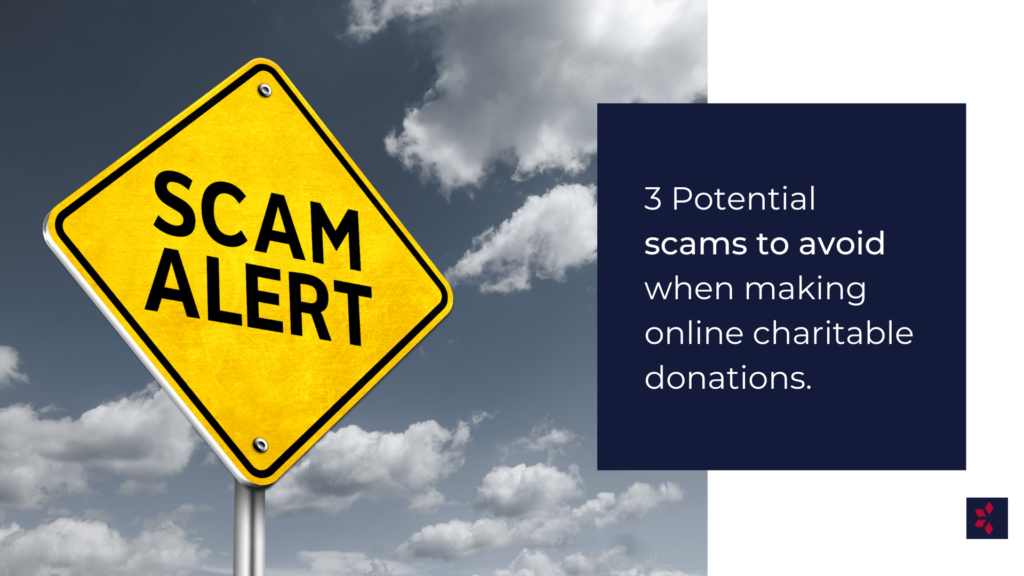3 Potential Scams to Avoid When Making Online Charitable Donations

You’ve generously decided to make a charitable donation, but then remembered stories of those who have been scammed by fake charities. How do you avoid these scams that try to take advantage of your compassion for those in need? This article describes three potential online charity scams you should watch out for to save you from becoming the next victim!
Opportunistic Websites or Social Media Accounts
Cybercriminals are opportunistic—they are quick to leverage opportunities that allow them to ask for money. This means capitalizing on matters that are currently garnering mass attention.
Scammers can do this by simply creating an opportunistic (“pop up”) website or a social media account after an impactful event or during a trending cause, describing themselves as a “newly founded charitable organization” to support that particular event or cause. For example, “Raise Money for (a Current Event).”
Before donating anything, beware that it may be a fake charitable organization. You may be directed to a fundraising page or be provided a link you can click into to donate, but instead of donating money to those in need, you may be giving money and your personal information to scammers. Always do your research and verify the validity of the recipient.
They Reached Out to You By Email But…
A scammer may contact you by emailing you.
If the email goes into your spam box or if the email looks suspicious, do not click on any of the links or open any of the attachments provided as they are usually malicious and are phishing emails that intend to steal your personal information or install malware on your device.
A scammer may impersonate an employee or member of a well-known charity, pretending to legitimately ask for donations on behalf of the charity. Therefore, pay attention to both the name and email address of the sender. Don’t just check the name of the person sending you the email but check their email address by hovering your mouse over the “from” address to see if alterations have been made, such as “@red12cross.ca” versus “@redcross.ca.” If you see something like this, it is generally a phishing scam.
Misspellings in the website URL link provided (e.g. “redcros.ca”) can also indicate a phishing scam as scammers cannot replicate the exact website address of the legitimate organization but set up a scam site with a name as close to the real charity as they can get.
To protect yourself, know that legitimate organizations will never ask for your personal or financial information through email so be sure to be extra cautious when reading through your inbox.
They Ask You to Donate Through Wire Transfer or Gift Cards
Scammers know that once you send money to them in the form of a wire transfer or gift cards, there is usually no way to recover that money. Whenever someone demands to be paid with a gift card, it is usually a scam—gift cards are for gifts and not payments.
The Bottom Line
The above examples are just three of the potential scams you may wish to watch out for when making an online charitable donation. Cybercriminals have become sophisticated scammers.
Nevertheless, donating money online can still be safe when done correctly. The best way to avoid these scams is to do your homework (lots of it) to make sure you are donating to a registered charity and make donations directly from the charity’s official website, which should be secured. A secured website begins with “https” and has a padlock icon in front of it.
If you are in the process of selecting a trusted charity to which you wish to make regular donations for several years, not only is it crucial to avoid these pitfalls, but you may also wish to learn more about how to select your target charity. We encourage you to read Bloom Investment Counsel, Inc.’s How to Select a Charity and Build an Enduring Philanthropic Legacy for three important tips in that regard, along with a way to generate the desired income for donation purposes, which we hope will help guide you towards making a meaningful decision.
This content is provided for general informational purposes only and does not constitute financial, investment, tax, legal or accounting advice nor does it constitute an offer or solicitation to buy or sell any securities referred to. Individual circumstances and current events are critical to sound investment planning; anyone wishing to act on this content should consult with his or her financial partner or advisor.